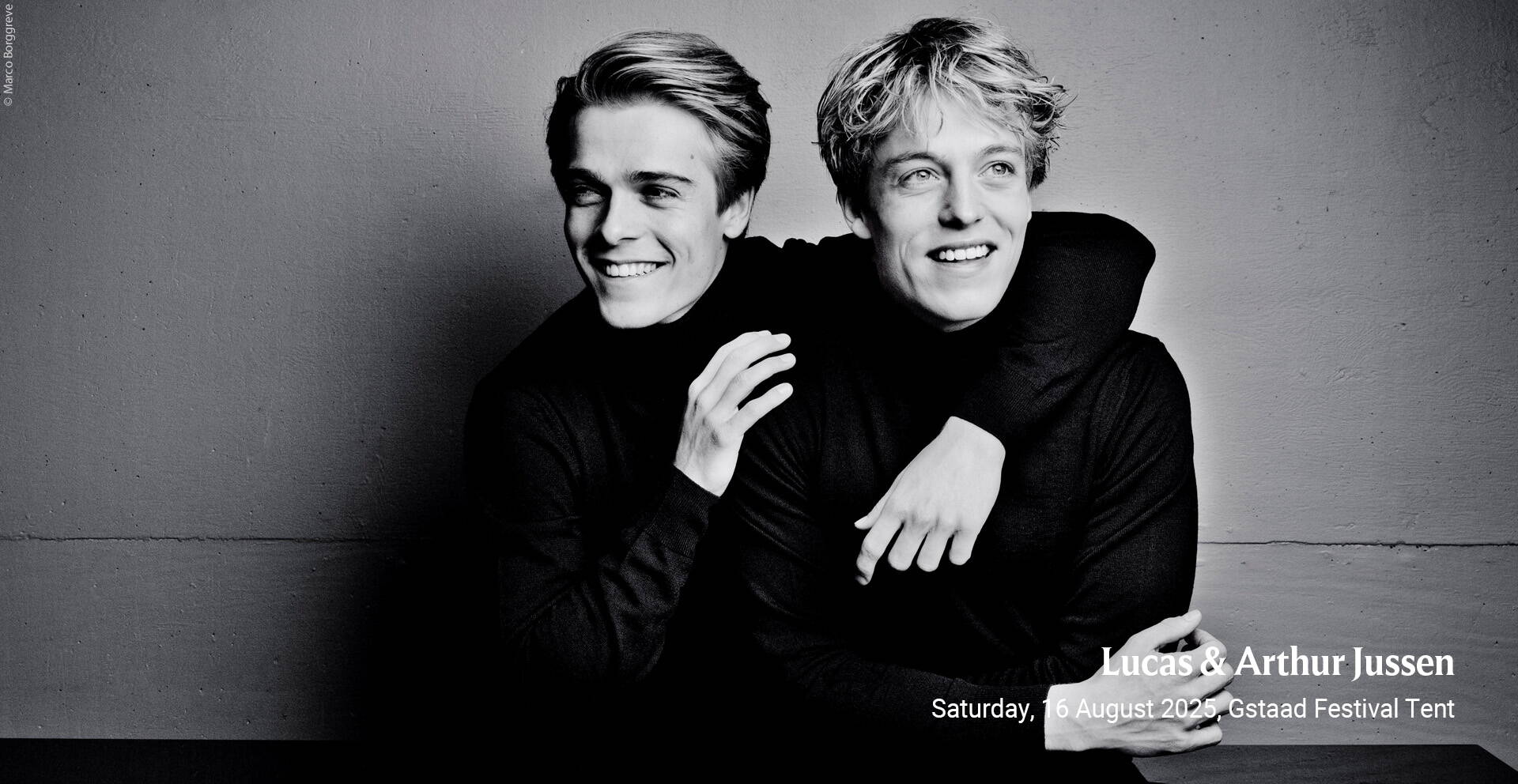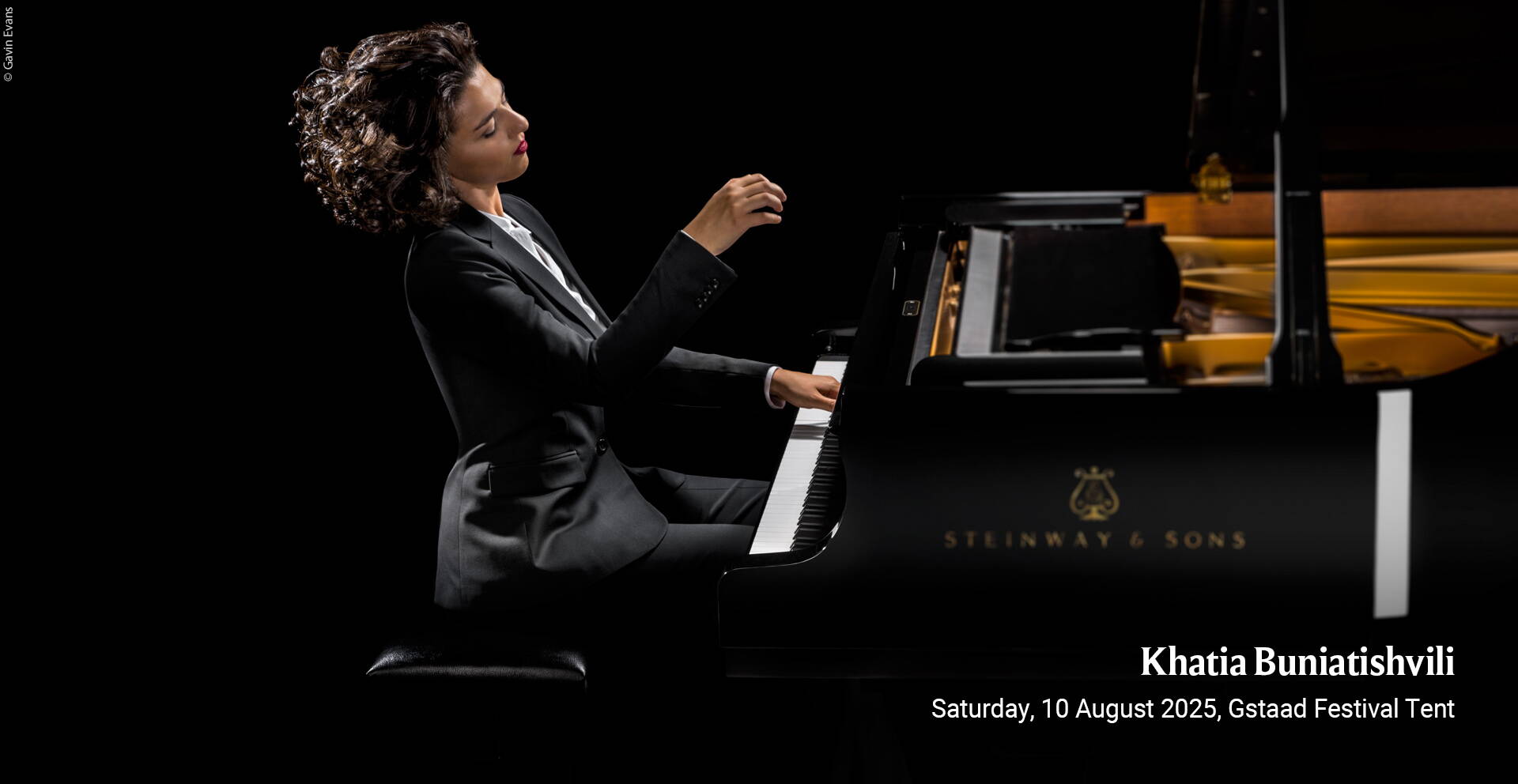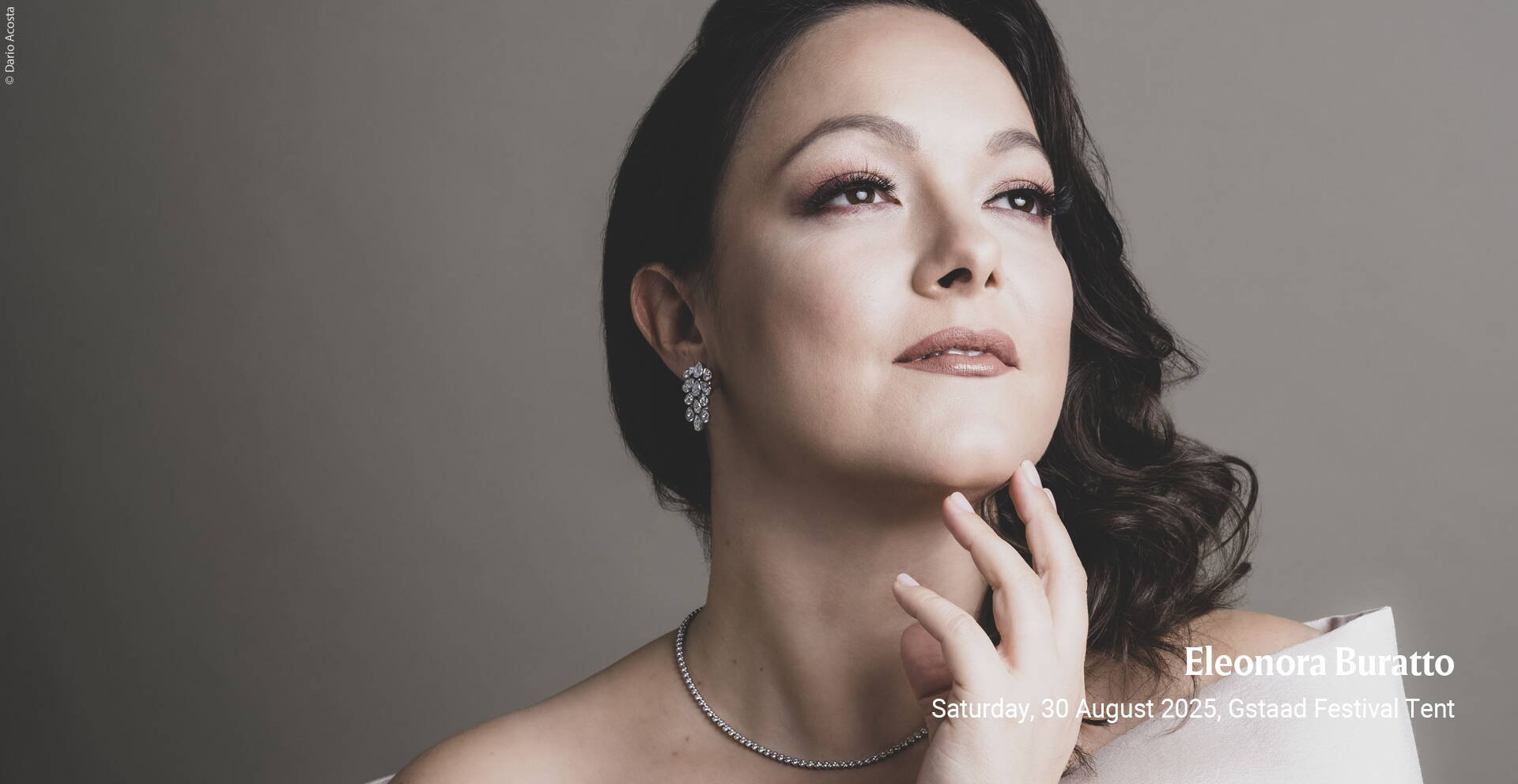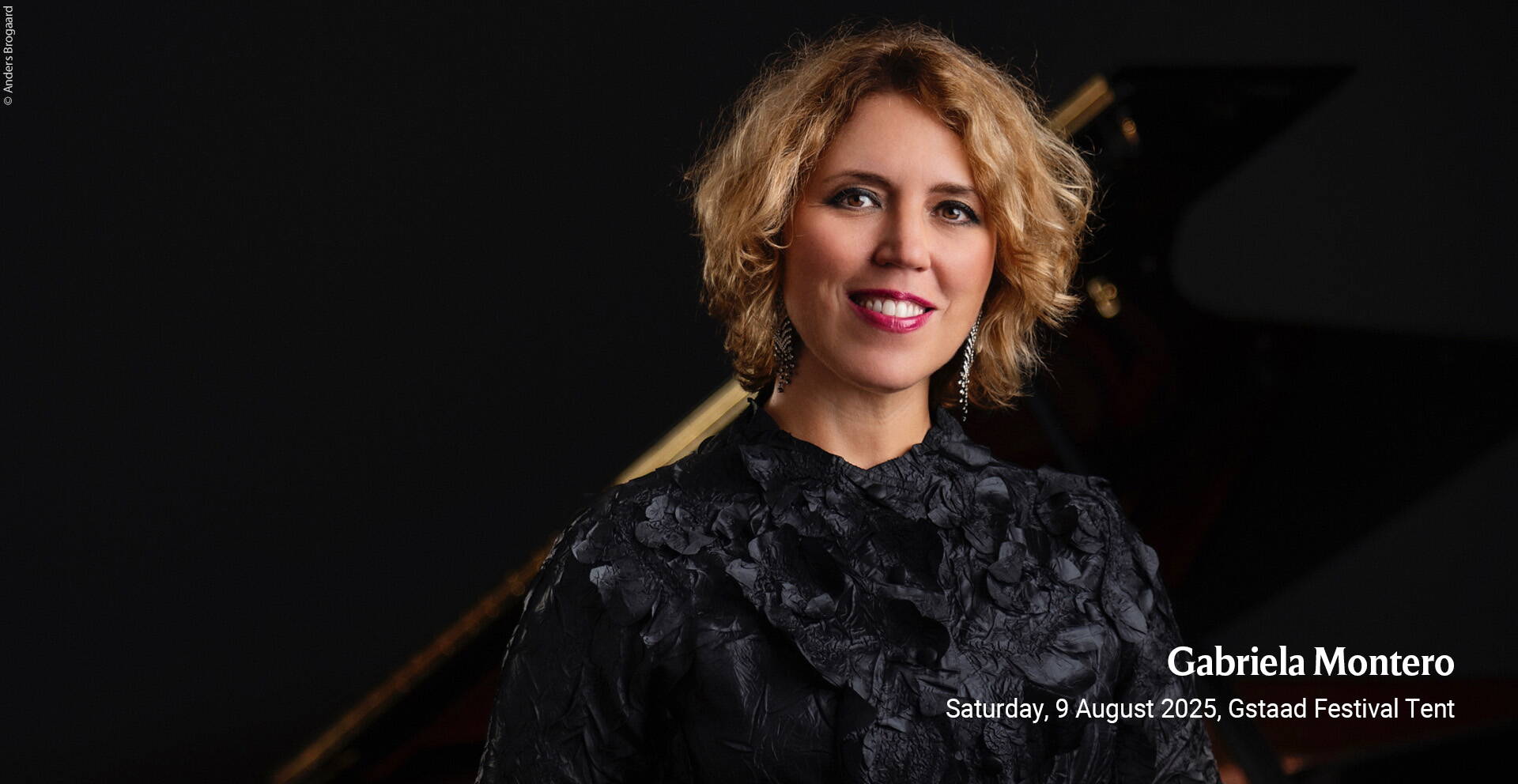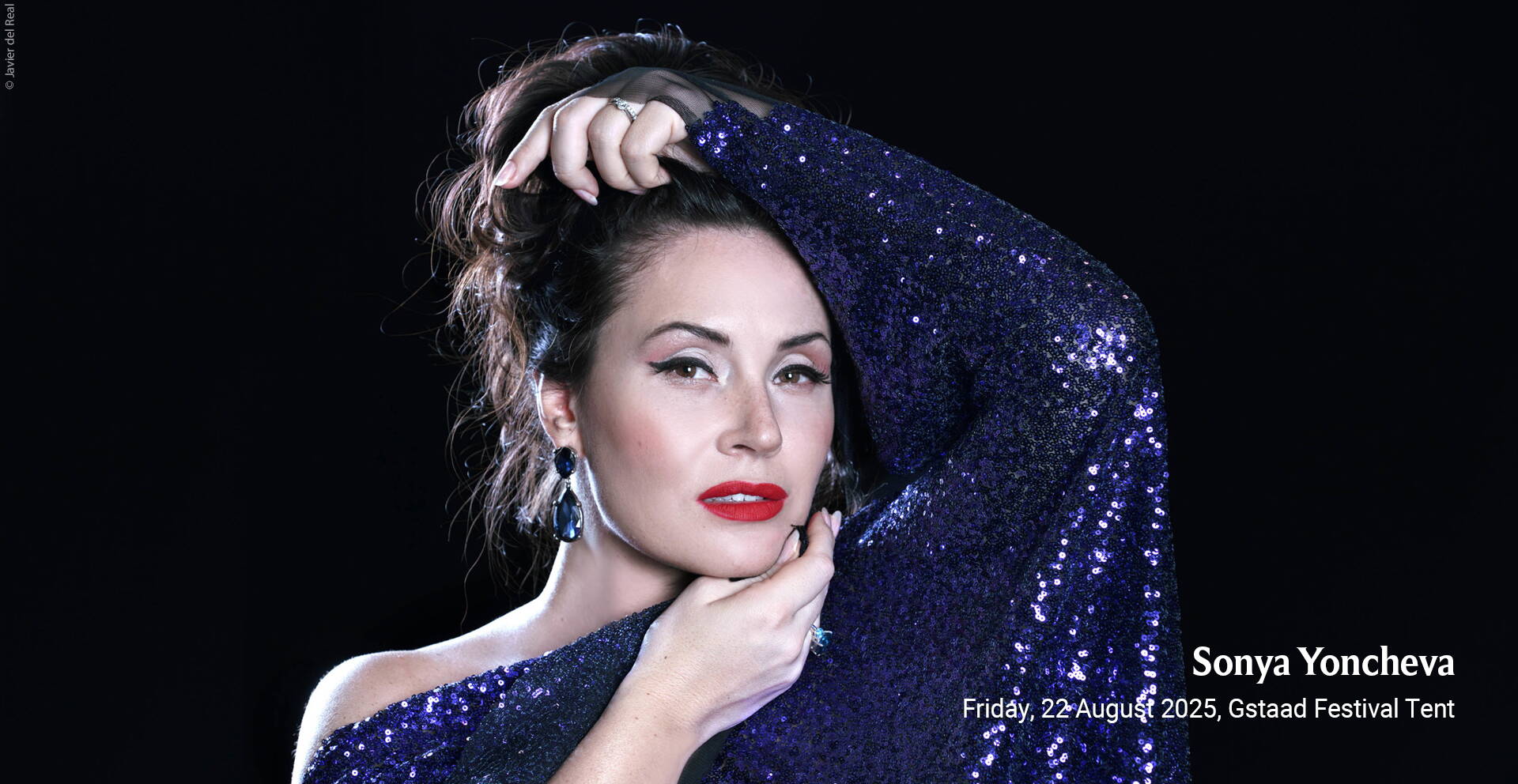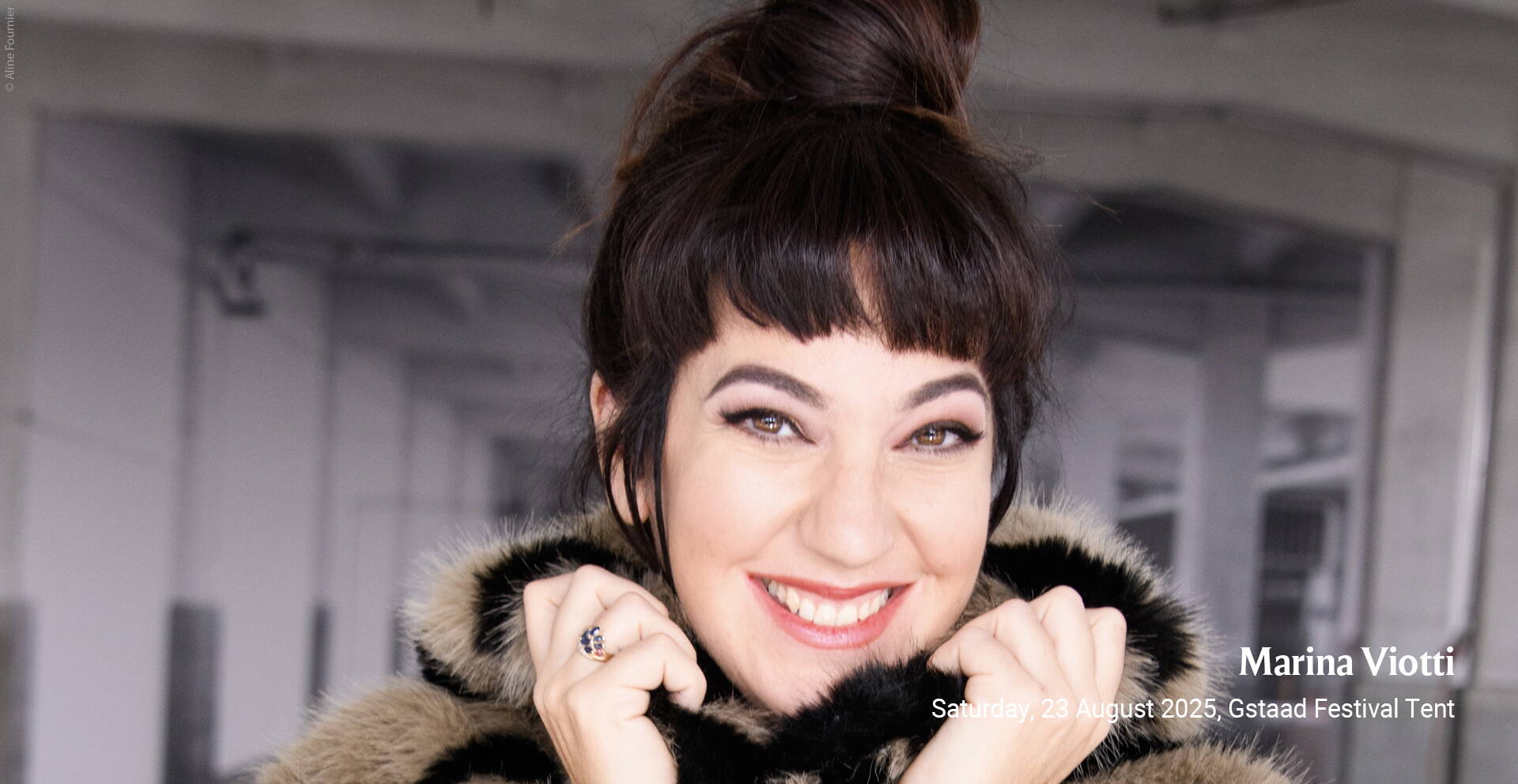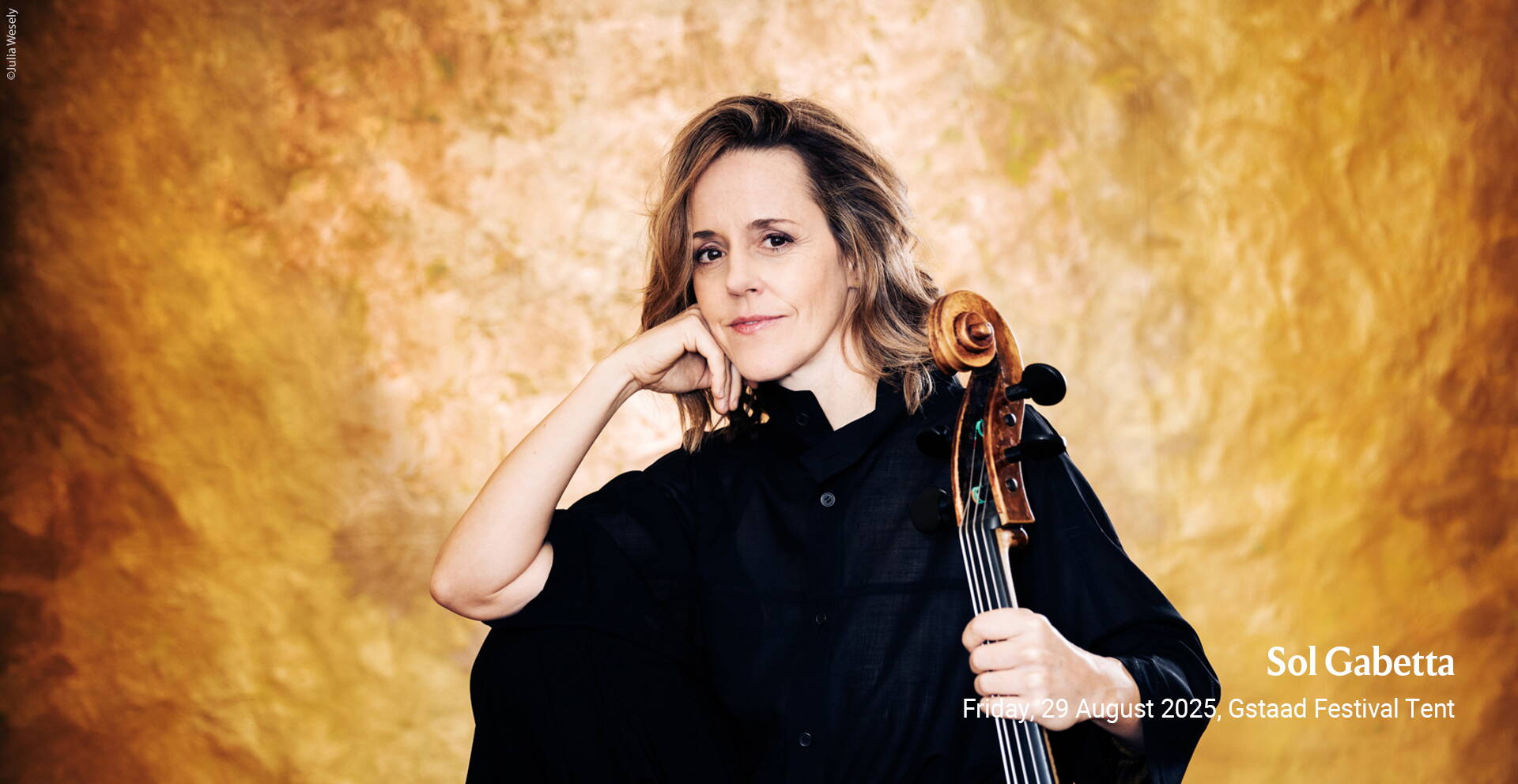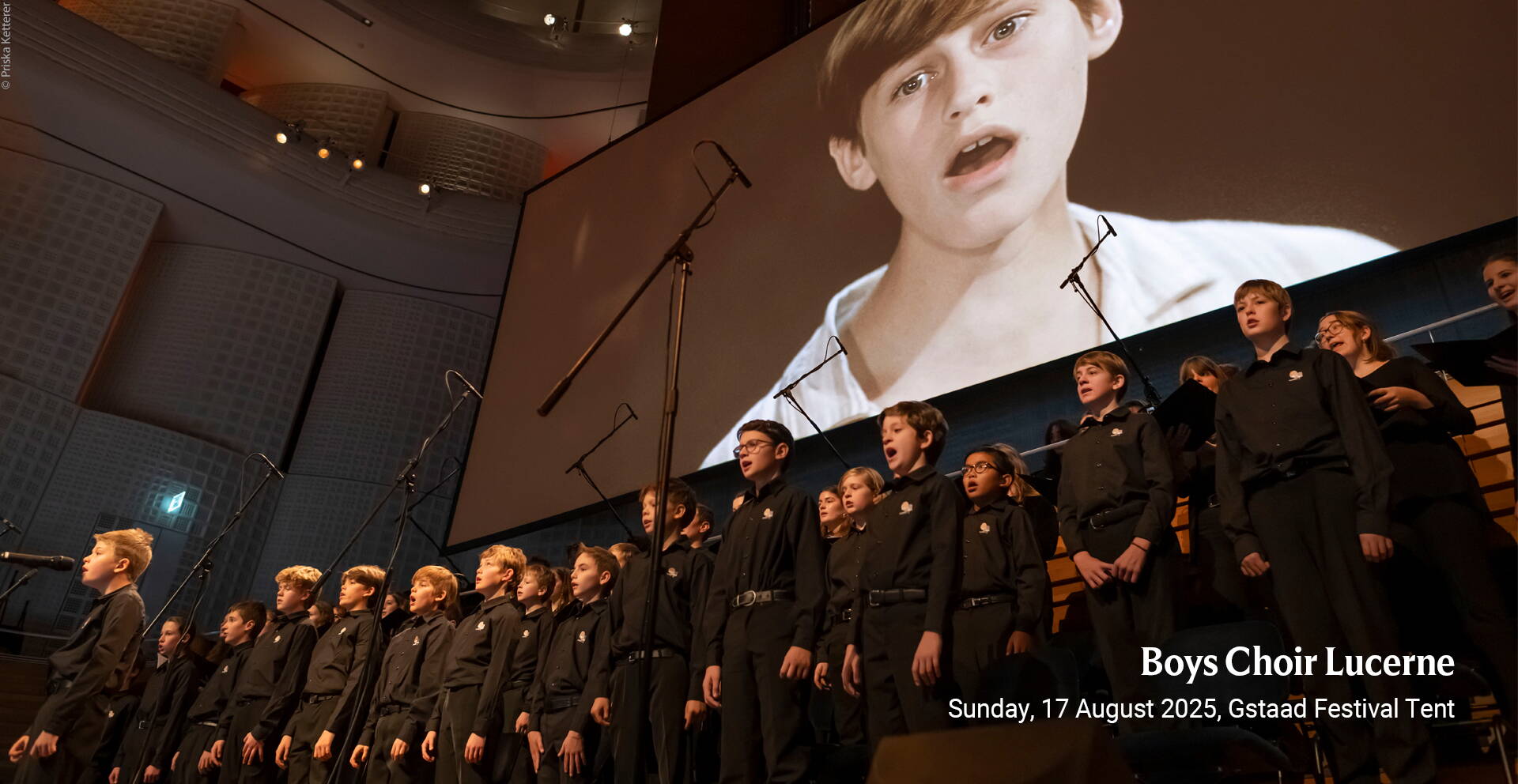68. Gstaad Menuhin Festival & ACADEMY | 12. July – 31. August 2024
We find ourselves in a time of change. Our organisation is committed to execute the Festival in a more resource-efficient and sustainable manner, thereby positioning it in the right place for the future. With this project, named “Mission Menuhin”, we eagerly enter the second year of our three-year programme cycle “Change”.
Transformation. Transformation has always been an integral part of human development, or else we would still be dwelling in caves nowadays. However, the term “transformation” is being used excessively in the years 2023 and 2024. In the current German coalition agreement, the term appears no less than a total of forty-two times. The energy transition is a technology revolution of huge impact, while the term digital transformation has been introduced to talk about the various changes in business and society due to the increased usage of digital technologies. Social values are changing rapidly, and anything that needs to change must undergo processes of transformation. Clinging to the old equals stagnation. Innovation is in high demand. The continuous pursuit of the unknown has kept the cultural scene in an unceasing state of change from the very beginning. Humanity continues to evolve culture from one generation to the next, constantly shedding new light on their own surroundings. Simultaneously, it requires courage to create something new and to experiment. To maintain relevance, we must exhibit a certain level of consistency and radicalism in artistic expression. We need new concert forms, fresh formats, innovative modes of expression, and new musical languages to effectively fulfill our cultural mission and, in the process, reach new audiences.
Transformation unleashes forces, as resources are converted into new forms of expression. The energy gained from transformation is the only element that can reduce the acceleration of climate change, accompanied by the adoption of new, sustainable energy sources. Transformative processes within our society also come along with altered ways of life, new values, shifts in mindset, new positionings and priorities, as well as the rise of a new generation, the Generation Z (1995 – 2010), which fundamentally embraces different stances regarding sustainability and climate protection, as evidenced by global movements like “Fridays for Future”.
“Trans” is a Latin preposition that translates to “across” or “beyond”. It signifies movement from one place to another (trans-port), or a transition from one state to the next (trans-formation). In nature, transmissions guide the journey from the earthly realm to the ethereal, or even the mystical (trans-cendence). Values and knowledge are handed down from one generation to the next (trans-mission), close connections and cultural exchange facilitate the transfer of language (trans-lation), and so on ...
In view of the 68th edition of Gstaad Menuhin Festival & Academy, our aim is to infuse these transformative energies into music. Therefore, we’ve grouped all concerts into three thematic areas, creating a programme that unfolds on three unique levels: “Trans-cendence”, “Trans-Mission”, and “Trans-Classics”.
Music inherently wields a profound metaphysical influence, hovering in its expression between the earthly and the ethereal, between sensual perception and access to formless dream worlds. The transcendence of a tragic moment through love forms the core of Richard Dehmel’s “Verklärte Nacht”, that inspired Arnold Schönberg in composing his eponymous string sextet in 1899. The transcendental quality in the songs of Franz Schubert and the lyrical elements in his mass compositions beautifully converge in his Mass No. 5 in A-flat major. From Richard Strauss’ “Metamorphosen” resonates a transcendent music, liberated from all externalities, that bears witness to profound emotional turmoil, which burdened Strauss heavily after witnessing the destruction of his hometown, Munich, in 1946. Few operatic works delve as deeply into the yearning for transcendence as Wagner’s “Tristan”. The wish for annihilation in “love-death” as the only path to the union of lovers and the glorification of night as a mysterious metaphysical homeland: Friedrich Nietzsche even called “Tristan and Isolde” the “true opus metaphysicum of all the arts”. In Gustav Mahler’s Symphony No. 1, the core concept revolves around the idea of suffering. Bearing the subtitle “Titan” in reference to a writing by Jean Paul, it follows the structure of a funeral march after the first two movements, mourning the world’s misery and sorrow. The finale commences as “the sudden eruption of a profoundly wounded heart” (in Mahler’s own words). Differing from Goethe’s “Werther,” the final movement concludes with an apotheosis. During its first performance in Weimar, the choral movement was titles “Dall’ Inferno al Paradiso” (“From Hell to Paradise”).
In Gustav Holst’s “The Planets”, the focus shifts towards celestial music. The suite sketches the life journey of a person from youth to the old age, who, after leaving behind their human life, ascends to a new mystical plane. Along this journey, specific stages of personality development are portrayed through individual planetary movements. These movements encapsulate the entire spectrum of human personality, commencing with Mars as a symbol of rebellion, youth, and aggression and culminating with Neptune, representing metaphysical clarity and tranquillity (Source: Greene, Richard. Holst: The Planets. Cambridge University Press, 1995). All seven movements as part of the composition embody the musicalization of a human soul’s journey, serving the personal process of self-maturation and culminating in the transcendence of the soul to a higher level of consciousness.
We delve into the concept of “Trans-Mission” when it comes to the evolution of values, knowledge, culture and traditions across generations and eras. The transfer of wisdom, sharing experiences from one generation to the next, from idols to their admirers, from mentors to students, from parents to children, … all of it is intertwined with change, challenges of adaptation, metamorphosis, and reorientation. What we’ve been practicing as part of our academies for many years in the spirit of our Festival founder, Yehudi Menuhin, will now also become a central part of our concert programme. Think about Mozart, who pays tribute to his idol when dedicating his string quartets to Haydn, or about Bruckner and his art of transforming harmonies as made popular by Wagner in his Symphony No. 7, or the portrait of the almost forgotten 19th-century cellist Lisa Cristiani, or the premieres of composers like Emilie Mayer and Fanny Hensel – transmission is understood as the preservation and dissemination of musical values and compositions and is considered in the context of the constant transformation of the social environment in today’s world.
Finally, we’ll get to explore what we call the “Trans-Classics” series, which deals with the realm of performance and concert formats. I am convinced that in 10 years, there will be no more festivals revolving purely around classical music. Even in physical performance formats, transformations will occur, especially when it comes to the most “basic principle” of analogue performances: the concert. In the Baroque and Classical eras, concertgoers freely imbibed, dined, conversed, even danced, and made love during performances. However, as the Biedermeier and Romantic periods unfolded, and the educated bourgeoisie took centre stage, a distinct style of concert emerged, and its traditions continue to show their influence up until today. This includes dress codes for musicians and the audience, and suddenly, applause was only allowed at designated moments during the concert, next to strict times for entry and exit. Fortunately, classical music organisers have recognised that new audience segments and the younger generations have different expectations for the live music experience compared to what was considered the norm until recently. They want to be caressed, stimulated, challenged, but also just entertained by music. The classical music world is currently going through a period of transformation. To engage people and capture their long-term interest, there is a high demand for a shift and transformation in concert formats. The conventional classical concert format can no longer rely on repeating the same patterns and routines. Instruments are no longer confined to a specific era or genre; they traverse boundaries and evolve within concert programmes. The ideas behind programmes and styles of performances are transforming. The distinction between the so-called “E”- and “U”-music (the “high” and rather “popular” music) is becoming blurred. There will be fewer classical concerts in the “puristic” style in the future. The scene calls for opening itself and a character marked by accessibility and broad appeal. Musicians are exemplifying this transformation through inventive programme sequences and configurations, blending genres, styles, epochs, and exploring novel modes of expression and interpretation. When a lutenist and a soprano perform John Dowland, Henry Purcell, and Bob Dylan in the same program, or when a guitarist, backed by a Baroque orchestra, intertwines Vivaldi and Bach with Beatles classics, it can be seen as an immersive concert experience. When a breakdance group interpret Mozart, we perceive it as enthralling and pioneering – a concert format rich of experiential value. When a classical string quartet freely improvises on jazz and pop standards following a rendition of Shostakovich, and the evening culminates in a DJ party or ultimately when Dvorak’s Bohemian folk music becomes woven into his symphonies, these are transformative processes, accompanied by the deliberate dismantling of outdated barriers.
How do we place the concerts of the “Music for the Planet” series within the context of transformation? Venice, a city of longing and dreams, a city steeped in the echoes of its glorious musical past, yet it also symbolises death as a place of haunting, of immersion in forces that cannot be controlled. In her tribute to Venice, Anastasia Kobekina meditates through a blend of old and new melodies on the imagery of dreams and the grand topic of the transience of this lagoon city, whose existence is now challenged by rising sea levels.
Patricia Kopatchinksja’s “Time and Eternity” delves into stages of transformation, moments of catastrophic warfare and their consequences, while also embracing hope. In 1939, Karl Amadeus Hartmann composed his Concerto funebre as an expression of despair in face of the horrors unleashed by the Nazi regime, which threatened the European civilization with its downfall. The Concerto funebre can be seen as a portrayal of passion, a testimony to the suffering inflicted upon humans, all living beings, the very act of creation itself, and, perhaps, even the Creator (God?). In his Polyptyque (a violin concerto composed in 1973 for Yehudi Menuhin), Frank Martin set to music the Passion of Christ, drawing inspiration from paintings by Duccio di Buoninsegna (ca. 1255 – 1319) that he saw on the backside of the famous Maestà Altarpiece in Siena. Frank Martin found himself moved by the narrative of the Passion, which tells of God’s empathy with the suffering of the world. According to the Christian belief, this suffering paves the way for eternal redemption – a wellspring of hope during times of transformative upheaval, including the challenges posed by climate change.
What does change, any form of transformation within myself, within all of us really mean? As we navigate between societal responsibility and our individual lives, and oscillate between pessimism and hope, the 2024 Festival edition offers countless opportunities to collectively explore these questions. Surrounded by music, with all its varying emotions, images, and thematic connections, there is more time and space to contemplate these significant questions than in our hectic everyday lives.
Inspired by the programme of the 68th Gstaad Menuhin Festival & Academy, we look forward to sharing a transformative, energising, and joyful summer of concerts with our audience from July 12th to August 31st, 2024.
Fired up and filled with enthusiasm,
Christoph Müller
Artistic Director, Gstaad Menuhin Festival & Academy
Friday, 12 July 2024
7.30 pm, Saanen Church
Choral and Orchestral Concert
Opening Concert – Schubert and the Art of Longing – Trans-cendence I
Miriam Allan, Soprano, Ulrike Malotta, Mezzo-Soprano, Ilker Arkayürek, Tenor, Krešimir Stražanac, Bass, Collegium Vocale Gent, Camerata Salzburg, Philippe Herreweghe, Conductor
Saturday, 13 July 2024
10.30 am, Gstaad Chapel
Chamber Music
Matinée des Jeunes Etoiles I
Kevin Chen, Piano
Saturday, 13 July 2024
7.30 pm, Saanen Church
Choral and Orchestral Concert
Schubert and the Art of Longing – Trans-cendence I
Miriam Allan, Soprano, Ulrike Malotta, Mezzo-Soprano, Ilker Arkayürek, Tenor, Krešimir Stražanac, Bass, Collegium Vocale Gent, Camerata Salzburg, Philippe Herreweghe, Conductor
Sunday, 14 July 2024
6 pm, Zweisimmen Church
Chamber Music
Idées transformées – Julia Fischer I
Julia Fischer, Violin, Yulianna Avdeeva, Piano
Monday, 15 July 2024
7.30 pm, Saanen Church
Today's Music
Double Sens – Trans-Classics I
Nemanja Radulović, Violin, Ensemble Double Sens
Tuesday, 16 July 2024
7.30 pm, Saanen Church
Orchestral Concert
Metamorphosen – Trans-cendence II – Julia Fischer II
Julia Fischer, Violin & Direction, Camerata Salzburg
Wednesday, 17 July 2024
7.30 pm, Saanen Church
Chamber Music
Piano Pictures
Yunchan Lim, Piano
Thursday, 18 July 2024
7.30 pm, Saanen Church
Chamber Music
Transfiguration – Trans-cendence III – Julia Fischer III
Julia Fischer, Violin, Valerie Steenken, Violin, Nils Mönkemeyer, Viola, Louis Vandory, Viola, Daniel Müller-Schott, Cello, Friedrich Thiele, Cello
Friday, 19 July 2024
7.30 pm, Lauenen Church
Chamber Music
Haydn to Mozart – Trans-Mission I
Kristian Bezuidenhout, Fortepiano, Chiaroscuro Quartet, Alina Ibragimova, Violin, ,Charlotte Spruit Violin, Emilie Hörnlund, Viola, Claire Thirion, Cello
Saturday, 20 July 2024
10.30 am, Gstaad Chapel
Chamber Music
Matinée des Jeunes Etoiles II
Hana Chang, Violin, Robert Neumann, Piano
Saturday, 20 July 2024
7.30 pm, Saanen Church
Chamber Music
Slavic Folk Dances Transformed – Trans-Classics II – Julia Fischer IV
Julia Fischer, Violin & Piano, Alexander Sitkovetsky, Violin, Valerie Steenken, Violin (Dvořák), Nils Mönkemeyer, Viola, Benjamin Nyffenegger, Cello
Sunday, 21 July 2024
6 pm, Zweisimmen Church
Chamber Music
«A Farewell to the Beautiful World» – Trans-cendence IV
Sabine Meyer, Clarinet, Schumann Quartet, Erik Schumann, Violin, Ken Schumann, Violin, Veit Hertenstein, Viola, Mark Schumann, Cello
Tuesday, 23 July 2024
7.30 pm, Saanen Church
Orchestral Concert
Venezia and Beyond – Music for the Planet I
Anastasia Kobekina, Cello, Kammerorchester Basel, Julia Schröder, Violin & Direction
Wednesday, 24 July 2024
7.30 pm, Saanen Church
Today's Music
Hayato' Piano Transformation
Hayato Sumino
Thursday, 25 July 2024
7.30 pm, Zweisimmen Church
Today's Music
Baroque'n'Roll – Trans-Classics III
Miloš Karadaglić, Guitar, Festival Strings Lucerne, Daniel Dodds, Konzertmeister & Direction
Friday, 26 July 2024
7.30 pm, Rougemont Church
Today's Music
Richard Galliano New York Tango Trio – Trans-Classics IV
Richard Galliano, Accordion & Melowtone, Adrien Moignard, Guitar, Diego Imbert, Bass
Saturday, 27 July 2024
10.30 am, Gstaad Chapel
6 pm, Abländschen Church
Chamber Music
Matinée des Jeunes Etoiles III
Mishka Rushdie Momen, Piano
Saturday, 27 July 2024
7.30 pm, Saanen Church
Chamber Music
Recital Sir András Schiff
Sir András Schiff, Piano
Sunday, 28 July 2024
11.30 am, Eggli Lounge
Mountain Spirit
Four Celli on the Alp – A Sunday Brunch Concert on the Eggli – Trans-Classics V
Gstaad Festival Cello Quartet, Christopher Jepson, Cello & Direction
Sunday, 28 July 2024
6 pm, Saanen Church
Chamber Music
«Shadow and Light»
Sol Gabetta, Cello, Kristian Bezuidenhout, Piano
Monday, 29 July 2024
7.30 pm, Saanen Church
Orchestral Concert
Transformation of Dance – Trans-Classics VI
Daniel Hope, Violin & Direction, Zürcher Kammerorchester
Tuesday, 30 July 2024
7.30 pm, Zweisimmen Church
Today's Music
Irish Roots
Daniel Hope, Violin & Presentation, AIR Ensemble:Simos Papanas, Violin, Nicola Mosca, Cello, Emanuele Forni, Baroque Guitar, Markellos Chryssikos, Harpsichord, Michael Metzler, Percussion
Wednesday, 31 July 2024
7.30 pm, Berghaus Eggli, Terrace
Mountain Spirit
Best of Swing –
Andrej Hermlin and his Swing Dance Orchestra – Trans-Classics VII
Andrej Hermlin, Piano & Direction, Rachel Hermlin, Song, David Hermlin, Drums & Song, Swing Dance Orchestra
Friday, 2 August 2024
7.30 pm, Saanen Church
Chamber Music
Sol Gabetta Following the Footsteps of Lisa Cristiani (1827-1853) – Trans-Mission II
Sol Gabetta, Cello, Dmitry Smirnov, Violin & Ensemble
Saturday, 3 August 2024
10.30 am, Gstaad Chapel
6 pm, Abländschen Church
Chamber Music
Matinée des Jeunes Etoiles IV
Simon Zhu, Violin, Marco Scilironi, Piano
Saturday, 3 August 2024
5 pm, Gstaad Festival Tent
Gstaad Academy – Concert for All
Gstaad Festival Amateur Orchestra – Concert
Gstaad Festival Amateur Orchestra, Kevin Griffiths, Conductor
Saturday, 3 August 2024
7.30 pm, Saanen Church
Chamber Music
Recital Seong-Jin Cho
Seong-Jin Cho, Piano
Sunday, 4 August 2024
6 pm, Rougemont Church
Today's Music
«The Times They Are A-Changin» – Trans-Classics VIII
Lea Desandre, Mezzo-Soprano, Ensemble Jupiter (Paris), Thomas Dunford, Lute, Violin & Direction
Monday, 5 August 2024
7.30 pm, Boltigen Church
Today's Music
Pure Energy – Trans-Classics IX
Vivi Vassileva, Multi-Percussion, Lucas Campara Diniz, Guitar
Tuesday, 6 August 2024
7.30 pm, Saanen Church
Chamber Music
The Transformation of Preludes – Trans-Formation I
Jan Lisiecki, Piano
Wednesday, 7 August 2024
5.30 pm, Gstaad Festival Tent
L'Heure Bleue – Concert for All
Gstaad Conducting Academy – Concert I
Gstaad Festival Orchestra, Participants of the Gstaad Conducting Academy
Wednesday, 7 August 2024
7.30 pm, Berghaus Eggli, Terrace
9.30 pm. Berghaus Eggli, Terrace
Mountain Spirit
Visions of Classical Music – Trans-Classics X
Vision String Quartet, Electronic Music Event with DJ & E-Violinist Seth Schwarz
Thursday, 8 August 2024
7.30 pm, Rougemont Church
Chamber Music
The Transformation of Music – Trans-Formation II
Sayaka Shoji, Violin, Kian Soltani, Cello, Beatrice Rana, Piano
Friday, 9 August 2024
5.30 pm, Hotel Landhaus Saanen
L'Heure Bleue – Concert for All
Gstaad String Academy – Concert I
Participants of the master classes by Ana Chumachenco (violin), Ettore Causa (viola) and Ivan Monighetti (cello)
Friday, 9 August 2024
7.30 pm, Saanen Church
Orchestral Concert
Revolutionen – Trans-Formation III – Gstaad Festival Orchestra I
Lucienne Renaudin Vary, Trumpet, Gstaad Festival Orchestra, Participants of the Gstaad Conducting Academy
Saturday, 10 August 2024
10.30 am, Gstaad Chapel
Chamber Music
Matinée des Jeunes Etoiles V
Yibai Chen, Cello, Boyang Shi, Piano
Saturday, 10 August 2024
5.30 pm, Hotel Landhaus Saanen
L'Heure Bleue – Concert for All
Gstaad String Academy – Concert II
Participants of the master classes by Ana Chumachenco (violin), Ettore Causa (viola) and Ivan Monighetti (cello)
Saturday, 10 August 2024
7.30 pm, Saanen Church
Orchestral Concert
Time and Eternity – Music for the Planet II – Trans-cendence V
Patricia Kopatchinskaja, Violin & Direction, Camerata Bern, Pascal Viglino, Percussion, Beata Würsten, Sarah Würsten, Monika Würsten, Song, Wieslaw Pipczynski, Accordion
Saturday, 10 August 2024
10 pm, Berghaus Eggli, Terrasse
Mountain Spirit
Planets by Night – Night Concert – Trans-cendence VI
Gstaad Festival Brass Ensemble (brass musicians of the Gstaad Festival Orchestra), Immanuel Richter, Trumpet & Presentation
Sunday, 11 August 2024
11.30 am, Gstaad Festival Tent
Gstaad Academy – Concert for All
Gstaad Festival Youth Orchestra – Concert
Gstaad Festival Youth Orchestra, Matthias Kuhn, Conductor
Sunday, 11 August 2024
6 pm, Saanen Church
Chamber Music
Bach-Beethoven-Brahms – Trans-Mission III
Hélène Grimaud, Piano
Monday, 12 August 2024
7.30 pm, Lauenen Church
Chamber Music
Gstaad String Academy – Concert III – Chamber Music Concert
Ettore Causa, Viola, Ivan Monighetti, Cello, Students of the Gstaad String Academy
Tuesday, 13 August 2024
7.30 pm, Zweisimmen Church
Chamber Music
Eternal Songs – Trans-Classics XI
Konstantin Krimmel, Baritone, Hélène Grimaud, Piano
Wednesday, 14 August 2024
5.30 pm, Gstaad Festival Tent
L'Heure Bleue – Concert for All
Gstaad Conducting Academy – Birthday Edition – Concert II
Gstaad Festival OrchestraParticipants of the Gstaad Conducting Academy
Thursday, 15 August 2024
7.30 pm, Rougemont Church
Chamber Music
«Pathetic Variations» – Trans-Classics XII
Kate Liu, Piano
Friday, 16 August 2024
7.30 pm, Gstaad Festival Tent
Symphony Concert
The Heaven of Bruckner – Trans-cendence VII – Gstaad Festival Orchestra II
Janine Jansen, Violin, Gstaad Festival Orchestra, Jaap van Zweden, Conductor
Saturday, 17 August 2024
10.30 am, Gstaad Chapel
Chamber Music
Matinée des Jeunes Etoiles VI
Raphael Nussbaumer, Violin, Kateryna Tereshchenko, Piano
Saturday, 17 August 2024
7.30 pm, Gstaad Festival Tent
Today's Music
Breakin' Mozart – Klassik meets Breakdance – Trans-Classics XIII
DDC Dancefloor Destruction Crew, Dance & Choreography, Christoph Hagel, Stage Direction & Piano
Sunday, 18 August 2024
6 pm, Gstaad Festival Tent
Orchestral Concert
Symphonist Emilie Mayer – Trans-Mission IV
Hélène Grimaud, Piano, Kammerorchester Basel
Wednesday, 21 August 2024
7.30 pm, Temple de Château-d'Œx
Orchestral Concert
Créations Menuhin
Gary Hoffman, Cello, Sara Ispas, Violin, Vlad Osadchyl, Viola, Bohdan Luts, Violin, IMMA – Menuhin Academy Soloists, Oleg Kaskiv, Konzertmeister & Direction
Thursday, 22 August 2024
7.30 pm, Saanen Church
Chamber Music
«A Symbol of Life’s Renewal» – Trans-cendence VIII
Lucas & Arthur Jussen, Piano
Friday, 23 August 2024
7.30 pm, Gstaad Festival Tent
Opera in concert version
Tristan und Isolde – Trans-cendence IX – Gstaad Festival Orchestra III
Camilla Nylund, Soprano (Isolde), Jonas Kaufmann, Tenor (Tristan), Sasha Cooke, Mezzo-Soprano (Brangäne), Christof Fischesser, Bass (König Marke), Todd Boyce, Baritone (Melot / Kurnewal), Gstaad Festival Orchestra, Sir Mark Elder, Conductor
Saturday, 24 August 2024
10.30 am, Gstaad Chapel
Chamber Music
Matinée des Jeunes Etoiles VII
Seohyun Kim, Violin, Marco Scilironi, Piano
Saturday, 24 August 2024
7.30 pm, Gstaad Festival Tent
Symphony Concert
Folk Music in Symphony – Trans-Classics XIV
Alexandre Kantorow, Piano, Budapest Festival Orchestra, Iván Fischer, Conductor
Sunday, 25 August 2024
5.00 pm, Gstaad Festival Tent
Discovery
«Carmen» – Children's and Family Concert
Children from the Saanenland, Roumen Kroumov, Arrangement & Direction, Ensemble of the Gstaad Festival Orchestra, Margrith Gimmel-Dauwalder, Staging
Sunday, 25 August 2024
6 pm, Saanen Church
Chamber Music
Bach-Beethoven-Brahms – Trans-Mission III - Canceled
Hélène Grimaud, Piano
Tuesday, 27 August 2024
7.30 pm, Gsteig Church
Chamber Music
Jeunes Etoiles Prize Winners 2023
Samuel Niederhauser, CelloDenis Linnik, Piano
Wednesday, 28 August 2024
7.30 pm, Saanen Church
Chamber Music
Recital Yuja Wang
Yuja Wang, Piano
Thursday, 29 August 2024
7.30 pm, Zweisimmen Church
Chamber Music
Il giardino d'amore
Nuria Rial, Soprano, Maurice Steger, Recorder & Flautino, Julia Schröder, Violin, Christoph Dangel, Cello, Sebastian Wienand, Harpsichord & Organ
Friday, 30 August 2024
7.30 pm, Gstaad Festival Tent
Symphony Concert
«Dall’ Inferno al Paradiso» – Trans-cendence X
Vilde Frang, Violin, London Symphony Orchestra, Sir Antonio Pappano, Conductor
Saturday, 31 August 2024
11.30 am, Gstaad Chapel
Chamber Music
Matinée des Jeunes Etoiles VIII –
Winners Concert of the Kiefer Hablitzel | Göhner Prize
Chelsea Zurflüh, Soprano, Laurène Dif, Accordion
Saturday, 31 August 2024
5.30 pm, Rougemont Church
L'Heure Bleue – Concert for All
Gstaad Baroque Academy – Concert
Participants of the master classes around Maurice Steger (Early Music)
Saturday, 31 August 2024
7.30 pm, Gstaad Festival Tent
Symphony Concert
Sound of Planets – Trans-cendence XI
Bertrand Chamayou, Piano, Kaunas Choir Lithuania, London Symphony Orchestra, Sir Antonio Pappano, Conductor

